Giap/digest #32 - Style as a Martial Art - 16/18 February 2006
1.  54 in the US 54 in the US
2.  On Being an Ecocentric Storyteller On Being an Ecocentric Storyteller
3.  Cary Grant: Style as a Martial Art. A Conversation with Wu Ming 1 Cary Grant: Style as a Martial Art. A Conversation with Wu Ming 1
[At last, a real, proper issue of Giap/digest. Thanks to all the people who volunteered for translating our stuff!]
 54 IN THE US 54 IN THE US
Most pre-reviewers hated our guts when Q was published in the US.
Publishers Weekly wrote:
"Rich religious history is turned into bloated, tedious fiction in this Reformation-age epic produced by four anonymous writers lurking behind a pseudonym."
Not bad, isn't it? And it's just the opening line. The end was even better:
"A good amount of historical research is lumped throughout, but the period stylings are wooden and the story never gains enough momentum to carry readers along.".
And what about Kirkus Reviews?
"A modest entertainment, holding hours of fun in ferreting out anachronisms once the voices-sorting-out is through."
Ok, thanks.
They all complained about the (supposedly) anachronistic "bad language". To which we replied with  this article [Forgive Me, I'm Just A Fruit Picker: Notes on Pricks, Sons of Bitches, the Language We Used in Q and the Edulcoration of the Past]. this article [Forgive Me, I'm Just A Fruit Picker: Notes on Pricks, Sons of Bitches, the Language We Used in Q and the Edulcoration of the Past].
Apropos of bad language, a guy from "Springville, UT, USA" using the nickname "NeverSurrender", put an interesting comment on  the book's Amazon page, under the headline: "Horrible!". He wrote: the book's Amazon page, under the headline: "Horrible!". He wrote:
I was unaware that the F word was so widely used in 17th-century Germany. Especially since it wasn't coined until the 18th century in England. So much for historical accuracy. I couldn't make it past the first chapter because this book was so jarringly offensive.
Hey, man: this is nonsense. First of all, the novel is set in the 16th century, not the 17th.
Secondly, the F word has Saxon origins and goes waaaay back. It can be found in a 1598 dictionary.
Thirdly, even if your statement were true, your line of reasoning would still be absurd. In Germany, people speak German, not English. Maybe you didn't realize, but you read a translation. Even the original Italian text was meant as a translation in a way. The original 'F word' uttered by the characters is "ficken", which was commonly used in 16th century Germany, exactly like 'fottere' in Italy and 'foutre' in France.
We took a glance at NeverSurrender's profile on Amazon. The guy concerns himself with pornography addiction. He says there are very good books and CDs that can help pornomaniacs to overcome their obsession. What a coincidence: naked people putting the F word into practice.
Ok, this was the past. The novel was too European, we were aware of it, we knew it. Sales weren't bad at all, considering the welcome.
Is 54 as European as the previous novel was? Who knows. What we know is that it will be published in the US in July... and now pre-reviewers seem to love us.
Kirkus Special Edition: Spring & Summer Preview:
'The anonymous group of Italian authors who brought us the intriguing Reformation epic Q is back with another chapter in their mysterious project. The puzzle begins with the author’s identity - or, rather, the authors’ identities. Their first pseudonym, Luther Blissett, under which they published Q, honored a Jamaican soccer player who was marginalized by racial epithets during his career. The authors have changed their collective name to Wu Ming, meaning "no name" in Chinese, and their second project is a fast-paced, cinematic Cold War–era adventure starring Cary Grant and a heroin-and-horse-racing-kingpin from Naples. Moving rapidly from one glamorous city to another, 54 expertly marries high-wire thrills with astute social commentary. "It’s got glamour, the Cold War and Cary Grant - what more can a reader ask for?" says Jennifer Gilmore, director of publicity. "It’s also accessible, fun and commercial.'
Publishers Weekly:
'The midlife crisis of Cary Grant, the founding of the KGB and the Neapolitan years of mafioso Lucky Luciano are just three of the plot lines woven into this dense, playful and always surprising literary behemoth set mostly in the year of the book's title, at the height of the Cold War. Anchoring the tale with a relatively conventional narrative is a young Bolognese man named Robespierre (Pierre), who embarks on a transcontinental odyssey to find his father, Vittorio Capponi, a former Mussolini loyalist who left the Italian army to join the Communists in Yugoslavia. Meanwhile, Britain's spy agency MI6 approaches Cary Grant (who's in a career slump) with a bizarre proposal: the role of Yugoslavian leader Marshal Tito in a propaganda biopic.
It seems impossible that the multitudinous names and story threads could converge, but, deliciously, they do - in Yugoslavia, where Grant meets Tito, Pierre finds his father, and Luciano's driver Steve "Cement" Zollo tangles with the KGB, which is about to pull off a big hit. The latest joint effort (after the novel Q) from Wu Ming - a collective of five Italian intellectuals who named themselves "anonymous" in Mandarin - offers political commentary-cum-complicated escapism for the brainiac reader.'
A few inaccuracies, ok, but the first and last sentences are pretty good stuff this time.
We'll see what happens.
Of course, we look forward to read NeverSurrender's comment on the first chapter, which – as some of you already know - is jarringly offensive. It contains the C word.
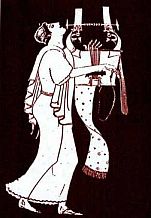 ON BEING AN ECOCENTRIC STORYTELLER ON BEING AN ECOCENTRIC STORYTELLER
"Community" is not fashionable among the literati. On the contrary, the "clan" is in great fashion, and so are the gang, the clique, the coterie, the provisional union of narcissists who reciprocally tell each other how good-and-yet-unappreciated they are, before quarrelling and telling one another to go fuck themselves. Consolatory self-narrative is in ("I’m great, but people don’t get me"; "culture is dead, that's why I don’t fit in"), a narrative that inevitably resembles a circle jerk. They claim this ineffective group therapy is a form of "resistance", a "political" act.
On this type of conduct impends the "long bleak shadow" of the myth of the Author - a romantic, decadent, myth of doomed self-obsession, fostering an idea of literature that is both tremendously ego-centred and "anthropocentric" in the most negative sense possible. The Author's shadow weighs several tons, and it breaks the backs of those who see themselves as heirs to a tradition of titanism, the Author in an attitude of defiance, open legs and hands on hips, standing on the extreme promontory of the centuries.
It's about the time for our colleagues to unburden themselves of an idea of authorship that, in truth, is very recent, and rediscover the "ecocentric" dimension of the writer (the web can be very helpful for this). The "eco" prefix comes from the Greek verb 'oikein' - to inhabit, to dwell, to reside. The ecocentric storyteller is like the "resident writer" whom [Swiss author] Peter Bichsel wrote about, the poet/storyteller as member of a community, indeed, of several communities in concentric circles, heir to figures that existed since the dawn of time, from the rhapsode to the griot, from the bard to the minstrel, from the storyteller to the puppeteer etc. Prose, poetry, and narratives as gifts to the community, this is a trade, a craft, the craft of living among our fellow human beings.
In order to live ecocentrism in literature, we have to pare the irritated and contracted muscles from the bones. An energetic massage is needed. The Net forces us to come to terms with openness and defies us to confront ourselves with new possibilities, with the constant risk of "losing our style". We’re obliged to find an equilibrium. The Net requires us to put the ego into discussion, to put the Author into proportion. For this reason, in spite of everything, we love it like the pupil of our eyes, like the pupil of the eyes of everyone.
(Translated by Po'Mo Ho and WM1)
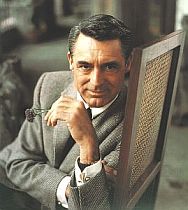 CARY GRANT: STYLE AS A MARTIAL ART CARY GRANT: STYLE AS A MARTIAL ART
A conversation with Wu Ming 1 (2005)
[At the end of 2004, we took part in an international three-day conference on Cary Grant at the Museo Nazionale del Cinema in Turin, organized by professor/script-writer Giaime Alonge, who teaches History of Cinema at the Università di Torino. The following interview took place a few months later and will be included in the book collecting that conference's papers and proceedings. If the first answer sounds familiar, that's because it's an extended version of an answer we gave to  "3am Magazine" in the same days.] "3am Magazine" in the same days.]
GIAIME ALONGE - What gave you the idea to include Cary Grant in 54? What do you find fascinating in this character?
WU MING 1 - The first chapter in which Cary appears includes a long pseudo-historical and pseudo-theoretical tirade, a sort of marxist analysis of the Grant-myth and his value in the proletarian struggle.
The purpose was satirical, it's a parody of the attempts to rationalize why we like something, or someone. We are inclined to think of other people as bidimensional figures, we don't grasp the depth, we see a square where there's a hypercube. We don't expect a person's ego to be fragmented; we point at inconsistencies and, in our turn, try to show ourselves as consistent, every part has to fit well with all the rest. If someone asks you: "How does your love for Country & Western music fit in with your ideas on the origins of stars-and-stripes reactionary rhetoric?"; or: "You claim to be an ecologist, how can you say you like that car?", the temptation is to force that passion of preference back under the umbrella of your ideology. "Radicals" go out of their way to prove that the music they listen is "radical", leftists explain why a certain kind of shoes doesn't belong to the Right etc.
In the above-mentioned chapter an indefinite omniscient narrator rambles on Cary Grant, the working class, and socialism. This is also a pre-emptive self-parody. It was like saying: when you ask us the reason why we included Cary Grant in our novel, our answer will be something similar to this. At the same time, we exaggerated and added a sentence by Marx turned into a joke ("In a classless society, anybody could be Cary Grant"). It's as we issued a notice: don't take this description too seriously. It makes sense, more or less. It's fascinating. But it came later. We included Grant - availing ourselves on a mistake by Wu Ming 2 - because we like him, we find him intriguing, we like his style.
I met the not-yet Wu Ming 4 eleven years ago, he'd just graduated and was about to begin university. The first time I entered his room, I saw a big poster of Cary Grant on the wall. It's not the movie star you expect to find above the bed of a nineteen year old. We have always admired people with style, those who knew how to turn their style into a martial art. "Style as a martial art" is also the name of a column I used to write for a local small mag in the late Nineties.
I hope this answer was intelligible. To avoid misunderstandings, I want to specify that I do listen to Country & Western, but I hate cars. I could never find them attractive. To me even the most glamorous Lamborghini is just a sad and lethal piece of plate.
I beg your pardon? What was the misunderstanding with WM2? Well, leafing through a 1954 magazine, he found an article on the film stars preferred female readers loved the most. Gary Cooper topped the list. WM2 jotted in a hurry "G.C." on his notebook. A few weeks later, going through his scrawls he read "C.G." instead of "G.C." and thought: Cary Grant. At our meeting he told us: "Cary Grant was the most popular actor among the female readers of such magazine." Inspiration! Cary Grant! Lets get hold of the films and biographies!
GA - What kind of research did you do on Cary Grant and in general on Hollywood's milieu of the early Fifties?
 WM1 - Bologna's most ancient video shop, Balboni, has thousands of vhs tapes. We rented about 50 of Cary Grant films and shot them up within a month. We read Graham McCann's biography (to whom we owe the interpretation of the character), Higham & Mosley's pruriginous one, and Geoffrey Wansell's illustrated one. David Niven's autobiographical books were also very useful: WM1 - Bologna's most ancient video shop, Balboni, has thousands of vhs tapes. We rented about 50 of Cary Grant films and shot them up within a month. We read Graham McCann's biography (to whom we owe the interpretation of the character), Higham & Mosley's pruriginous one, and Geoffrey Wansell's illustrated one. David Niven's autobiographical books were also very useful:  The Moon's a Balloon The Moon's a Balloon (the title is mentioned in the novel) and (the title is mentioned in the novel) and  Bring On the Empty Horses Bring On the Empty Horses . A hilarious reading to say the least. We read various things on Hollywood, the FBI and Joe McCarthy, but the most useful book was . A hilarious reading to say the least. We read various things on Hollywood, the FBI and Joe McCarthy, but the most useful book was  Official and Confidential Official and Confidential , J.E. Hoover's biography by Anthony Summers. Meanwhile, besides Hollywood, we also studied Cinecittà: we got hold of various Italian films released in 1954. Pierre's reaction on seeing Rossellini's Siamo donne [We, The Women] at the cinema was the same as ours on watching the vhs. , J.E. Hoover's biography by Anthony Summers. Meanwhile, besides Hollywood, we also studied Cinecittà: we got hold of various Italian films released in 1954. Pierre's reaction on seeing Rossellini's Siamo donne [We, The Women] at the cinema was the same as ours on watching the vhs.
Then it was important to understand how Hollywood was perceived by the Italian audience. For this purpose there were magazines and the newspapers' show pages.
GA - Which are your favourite among Cary Grant's films? Have you seen None but the Lonely Heart? If so, what do you think of it? I'm only asking because it's a film that didn't turn out well but it's interesting with regard to the proletarian origins of Cary Grant, an important element of his persona in 54.
WM1 - None but the Lonely Heart wasn't available at Balboni's and it's one of the few I haven't been able to see. Therefore I can't tell you a thing from a cinematographic point of view. That film certainly brought up all the sore points, all the biographies describe it almost as a moment of self-analysis. As for the films I prefer the most in the whole Grantian opus, there's quite a few. Even if it might sound predictable, I like To Catch a Thief and North by Northwest. In 2002, a few months after 54 had been published in Italy, I was at the Beaubourg in Paris. I happened to notice that To Catch a Thief was to be screened in the small theater that very afternoon. I dragged in my friend and saw the film for the thousandth time. I also like one of the least known films, People Will Talk, where Grant plays the role of an open-minded gynaecologist. Talk of the Town is another film I never get tired of seeing. Cary is a trade union activist on the run.
But the films I enjoyed most were I Was a Male War Bride and Operation Petticoat. I think that Grant got funnier in his Fifties, even funnier than he was in those 1930's screwballs comedies.
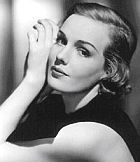 GA - To have included David Niven in the story is ‘natural': he and Cary were friends; but how did you get to Frances Farmer? Cary Grant had acted with her in The Toast of New York in 1937, but I don't think they had been close. The parallel that Cary traces between Frances' mental hospital experience and that of his mother, is it real or did you make it up? GA - To have included David Niven in the story is ‘natural': he and Cary were friends; but how did you get to Frances Farmer? Cary Grant had acted with her in The Toast of New York in 1937, but I don't think they had been close. The parallel that Cary traces between Frances' mental hospital experience and that of his mother, is it real or did you make it up?
WM1 - We made it up, but it has some credibility. The idea of including Frances Farmer had nothing to do with the film The Toast of New York though. The "intermediary", in our case, was the playwright Clifford Odets (director and co-author of None but the Lonely Heart) who had had a relationship with Frances (he is depicted as a despicable character in the biopic starring Jessica Lange as Frances) and was one of Cary's best friends. The rest comes naturally: the burden that the mental asylum had on both lives (Cary's mother thirty years of hospitalization, Frances' personal descent to hell), and the parallels between the McCarthy years and the ante litteram McCarthyism that persecuted Frances.
GA - How did you work on the dialogues? It's not easy to render an American 1950's movie star's way of talking and thinking. Some original Italian dialogues denote traces of English phrasal construction. Did you also study the cues of his films and his way of speaking?
WM1 - It's also difficult to render the way of thinking of artisan-prophets and proto-revolutionaries from the 16th century, or - as in our next collective novel - Iroquois Indians from the 18th century. Blatant anachronysm is to be avoided, but an excessive philological punctiliousness is even more dangerous because dialogues, above all, must be lively, even at the cost of some small licences. We write what sounds right, the sentences must make the ear smile.
In the case of Cary in 54, we were dealing with a depressed person sinking into an identity crisis, yet very meticulous and easily exasperated when other people overlook some details or don't respect certain small rituals. How does a person like that talk? Probably with a mixture of politeness, impatience and sarcasm which now and then gives way to brief outbursts of anger. We tried. The crucial test would be the English translation, that is… the return to Cary's original language. 54 was published in Great Britain in 2005 and the words the critics used the most to define our Cary were: "utterly convincing". Aren't these great satisfactions?
GA - Let's go back to the pseudo-marxist analysis you mentioned at the beginning. It's self-ironic, of course, and I absolutely agree that it's ridiculous to always try to justify ideologically one's own tastes but that passage (which, incidentally, I find lovely and which I used as a footnote to my article together with - obviously - a quotation by Marx: it appears I fell into your trap) expresses with clarity a very important question: in the last thirty years the average American has shifted ever more toward the Right. The idea of Cary Grant as the "Homo Atlanticus: civil without being boring; moderate, but progressive" accounts for the fact that before Reagan's presidency America, even under Republican presidents like Eisenhower and at the height of Cold War, maintained in its DNA the experience of the New Deal and the struggle against Fascism during World War 2. Somehow Cary Grant's charm is also based on this: his being so "distant" to us that live after the "historical split" of the Eighties.
 WM1 - This is the truth in that analysis we disguised as a visionary cavalcade. That's why I sad it "makes sense, more or less". WM1 - This is the truth in that analysis we disguised as a visionary cavalcade. That's why I sad it "makes sense, more or less".
We do not believe much in America's "lost innocence", the "good ole days" of American democracy, etc., simply because America has never been innocent. The tree's roots were already rotten on the Mayflower. It is a nation built - like the haunted house in Tobe Hooper's Poltergeist - on an immense Indian cemetery, as well as on slaves' common graves and layers and layers of ashes of lynched bodies. The myths of the origins (the Revolution, the Declaration of independence, etc.) have been demystified by the historians, starting from Francis Jennings' studies.
Having said this, we are not even "anti-american". We have often spoken and written against the temptation of taking ideological shortcuts. America is a complicated thing. It contains both great quantities of poisons and small but important antidote reserves. Looking at it today, Hollywood's "classic" period (let's say from the 1929 Crisis to Churchill's UN speech on the "Iron Curtain"), was a very liberal period. Even Grant acted in a film like Holiday, whose theme (slightly hazed by a pink mist) was class struggle, or the already mentioned The Talk of the Town (in how many later movies the trade unionist is the hero and not the villain?). McCarthyism closed the bracket, the first years of the Sixties re-opened it, then there was a remarkable "rightward shift", a forty-year long process beginning with Barry Goldwater's candidacy against L. B. Johnson.
Goldwater lost the electoral battle, but he sowed the seeds of a new "conservative revolution", with dangerous results for America itself and the fate of the entire world.
However, are we that sure that other "shifs" are not taking place today behind the façade? People getting together and marching for various causes? And then, we mustn't ignore the "stickiness" of some movements, ideas or tendencies. Another set of cultures, "the other America", continues to resist and to re-emerge. The vanguard of the American working class movement was swept away soon after the Russian Revolution (Valerio Evangelisti wrote his best novel on it, Noi saremo tutto [We Shall Be All]), and yet American radicalism didn't die. McCarthyism spread terror, and yet mass movements were born again after a few years. Those movements were in turn swept away (by Cointelpro, etc.), and yet under Bush Jr.'s first presidency we witnessed impressive mobilizations against war, in defence of the environment, etc.
GA - You just mentioned Graham McCann. You worked on the picture of Cary Grant he depicted in his book  Cary Grant: A Class Apart Cary Grant: A Class Apart . I totally agree because it's definitely the most reliable biography. When you were working on 54, Marc Eliot's volume hadn't been published yet but I can imagine that you haven't a great opinion of it (personally I found it a stupid book: the quintessence of "a non-authorized biography"). You also concur with McCann's clear standing about the "rumours" of Cary Grant's supposed bisexuality, which the biographer firmly confutes and which you [playfully] attribute to a misinformation campaign orchestrated by the FBI (by the way, I suppose the "rumours" on Hoover have been an interesting cue). But, besides the speculations on Cary's sexuality, did you never consider the hypothesis to use the bisexual theme to create the character? It would have been a trait in line with his "schizophrenic" nature: proletarian and aristocratic, English and American, Archie and Cary... . I totally agree because it's definitely the most reliable biography. When you were working on 54, Marc Eliot's volume hadn't been published yet but I can imagine that you haven't a great opinion of it (personally I found it a stupid book: the quintessence of "a non-authorized biography"). You also concur with McCann's clear standing about the "rumours" of Cary Grant's supposed bisexuality, which the biographer firmly confutes and which you [playfully] attribute to a misinformation campaign orchestrated by the FBI (by the way, I suppose the "rumours" on Hoover have been an interesting cue). But, besides the speculations on Cary's sexuality, did you never consider the hypothesis to use the bisexual theme to create the character? It would have been a trait in line with his "schizophrenic" nature: proletarian and aristocratic, English and American, Archie and Cary...
WM1 - Marc Eliot's book is definitely stupid, adding nothing to the bulk of writings on Grant. McCann's work remains unbeatable, a milestone. In the past Eliot wrote a lurid but interesting biography on Walt Disney, Hollywood's Dark Prince, a book my brother won in the phone contest "Hollywood Party" on Radio 3. That book must have been boycotted because in less than ten years it disappeared from catalogues, a little strange don't you think? Perhaps Eliot, after that terrible experience, decided to write less "subversive" things.
Funny enough, the Guardian's edition of the 21st May 2004 had a  comparative review of 54 and Eliot's book. The reviewer, Chris Petit, wrote that "our" Cary was more convincing than Eliot's. comparative review of 54 and Eliot's book. The reviewer, Chris Petit, wrote that "our" Cary was more convincing than Eliot's.
As for the second part of the question, we didn't depict Grant as bisexual for two reasons: first, we wanted to distance ourselves from the above-mentioned "scandalmongering" formulation, also because in Grant's case, it wouldn't be of any interest. I mean, if you were to talk about the fucks of someone like Errol Flynn, that'd be different... Flynn was a pleasant filthy person suffering from satyriasis, he was (unintentionally, it seems) involved in underhand intelligence activities, he was friends with a Nazi spy like Herman Erben. If I had to write about that, I might be amused, in fact I might even wet my pants laughing: Flynn's life really sounds like one of his cloak-and-dagger films, plus he wrote - or at least supervised - an autobiography ( My Wicked, Wicked Ways My Wicked, Wicked Ways ) where even the title has precisely that twist. ) where even the title has precisely that twist.
Archie Leach had an interesting life too, but for different reasons: the relationship with his mother, the labour of "inventing" the Grant character, his obsession for self-control and even the tiniest details, the self-management of his career at a time when actors were puppets in the hands of the Studios' masters… We wrote about this.
The second reason was that we already had a very complex and multi-faceted character in our hands, very difficult to portray: schizophrenic, depressed, skeptical, demotivated… Had we added bisexuality, never mind "utterly convincing": we would have never been able to shape him.
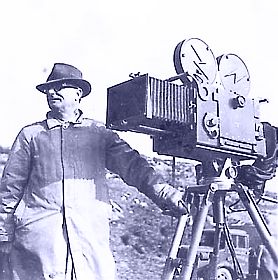 GA - Let's talk about your "soloist" novel New Thing. Here, unlike 54, there are no characters belonging to the star world, except for some in-jokes, like the insertion of Lou Canova - from Broadway Danny Rose - in the list of the Italian American crooners. However, on reading the book, I realized the importance cinema has for your work writing-wise. On the other hand, in the afterword of New Thing, you described your methodology using terms taken from the cinematographic language: "director", "editing", "documentary". Is it simply a metaphor, or do you think that there's a real homology between some literary writing styles and the cinematographic (or, if you prefer, audio-visual) language? Personally, I'm always a little wary to use words such as ‘editing' outside of a strictly audio-visual context because it could lead to generic statements (anyway, even Eisenstein did it…). In some cases, however, the relation is really close. GA - Let's talk about your "soloist" novel New Thing. Here, unlike 54, there are no characters belonging to the star world, except for some in-jokes, like the insertion of Lou Canova - from Broadway Danny Rose - in the list of the Italian American crooners. However, on reading the book, I realized the importance cinema has for your work writing-wise. On the other hand, in the afterword of New Thing, you described your methodology using terms taken from the cinematographic language: "director", "editing", "documentary". Is it simply a metaphor, or do you think that there's a real homology between some literary writing styles and the cinematographic (or, if you prefer, audio-visual) language? Personally, I'm always a little wary to use words such as ‘editing' outside of a strictly audio-visual context because it could lead to generic statements (anyway, even Eisenstein did it…). In some cases, however, the relation is really close.
WM1 - Nowadays it is very unlikely for a writer to have solely - strictly - literary influences. I would go as far as saying that it's impossible. Literature is a subset of communication, intersected by all the other subsets and media which in turn describe and narrate one another: the first hint for a novel may come from reading an interesting post on a blog dedicated to a film based on a book that contains a description of a videogame in which there's a comic strip portraying a theatrical drama based on a book inspired by a news story widely related by newspapers and television in a way drawn from the typical stereotypes of the cinematographic imaginary whose origin can be traced back to those old pulp magazines whose prose was inspired by the newspapers and magazines' "crime news". The first hint for a novel may come from hearing a song in a film based on an event occurred to one of your neighbours who used to host a radio show and enquired on the work of theatrical collectives in prisons.
A writer can't help but being influenced by all these rebounds and feedbacks, and I'm not only referring to the plot or content of a book. By "first hint" I also mean the expressive method, the techniques that the narrator wishes to acquire, the style he'd like to adopt. On watching a documentary or on reading a work of oral history, the writer may feel challenged to imitate and render in another medium a particular way of editing and juxtaposing the texts, of skipping between past and present, etc. Add the fact that we have never claimed to write "literature" in the strict sense of the word, granted that a "strict" sense exists (I've got serious doubts on the subject). We've always said that we're interested in story telling, no matter the medium. We don't discriminate between the media, the arts and the genres. Since the days we were writing Q, we have always used a para-cinematographic, spurious, not very literary terminology: "here goes a flashback", "dissolve-out here"… We even compared the title-naming villain to a camera on a dolly, shooting History from a bird's eye-view, while Gert/Ludovico's look was the hand-held camera, subjective and shaky, passing through the class war at man's height…
Finally, the majority of the influences found in our novels are more cinematographic than literary. 54's long passages in the middle register (i.e. the chapters with Pierre and Angela) were inspired by the tearjerkers of that period, Raffaello Matarazzo's love films starring Amedeo Nazzari. It goes without saying that the "Grantian" chapters draw their atmosphere from the films we watched, as well as the "spy-story" chapters, etcetera. Q owes more to Sergio Leone, Sam Peckinpah, and Kurosawa's "chambara movies" [swordfight films]. Guerra agli umani owes much to the Cohen brothers' Fargo and The Big Lebowsky.
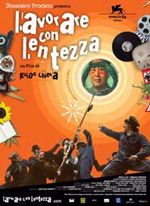 GA - As regards the relationship between cinema and literature, let's shift to the techniques of writing. I would like to dwell on the fact that you also work with the film industry: you co-wrote the script for Guido Chiesa's Lavorare con lentezza [international title: GA - As regards the relationship between cinema and literature, let's shift to the techniques of writing. I would like to dwell on the fact that you also work with the film industry: you co-wrote the script for Guido Chiesa's Lavorare con lentezza [international title:  Radio Alice]. However, the notion of collective and anonymous writing, already includes some similarity with script writing for the cinema. In fact, scriptwriting is often many-handed, and though it isn't anonymous in the real sense of the word, it certainly isn't 'authorial' writing (the film's Author is the director, but the names of the scriptwriters, though they appear in the opening credits, are not known to the common spectator). What differences and what elements of continuity do you find between writing a novel and writing for the cinema? Radio Alice]. However, the notion of collective and anonymous writing, already includes some similarity with script writing for the cinema. In fact, scriptwriting is often many-handed, and though it isn't anonymous in the real sense of the word, it certainly isn't 'authorial' writing (the film's Author is the director, but the names of the scriptwriters, though they appear in the opening credits, are not known to the common spectator). What differences and what elements of continuity do you find between writing a novel and writing for the cinema?
WM1 - Unlike other authors working for the cinema, we have benefited from already being a collective: since the beginning we've developed a series of methods of writing not very different from those adopted by scriptwriters. Moreover, we wrote the film-script together with Guido, who accompanied us through all the phases. This said, we had difficulties and some can be noticed in the final result. On writing for the cinema you can't afford to be too subtle with your nuances and shades of meaning. For example, you can't commit too many things to a single cue, a hint placed at the right moment. A film is not a book, if you feel you've "lost" something you cannot re-read a paragraph, you can't flip through the pages until you find the thing you overlooked. I'll give you the example of a crucial dialogue in Radio Alice, the one between the ‘carabinieri' (lieutenant Lippolis and his direct superior) before the riots and the killing of Francesco Lorusso. If at that precise moment someone had gone to wee or was busy talking, he wouldn't be able to grasp the weight of the allusions and the tongue-in-cheek, and if he missed the phrase: "We have carte blanche", Lorusso's death would seem to have happened by chance. Hence some very ideological criticism of the film, regarded by some as playing down that death. It's nonsense, it's not true, but the mistake in the perception stems from a fault in the writing. We are responsible for that.
The same applies for the hundreds of details we love to put in a book, especially details and allusions that we call "time bombs", which only a few readers notice at first reading. They go off if and when you re-read the book. The inspiration came from the renowned mirror-scene in Dario Argento's Profondo Rosso [Deep Red], the recognition that makes the film memorable. The first time you run through that lobby, you catch a glimpse of something but you don't realize. The second time you pass and "click!" goes the brain: everything takes a new meaning. Radio Alice is also full of details, tiny particulars, hints, after-effect cues…. Only, as I was saying, we are not talking about a book. If you don't grasp them the first time, who knows whether you'll want to see the film again...
(Translated by Bianca Colantoni)
|